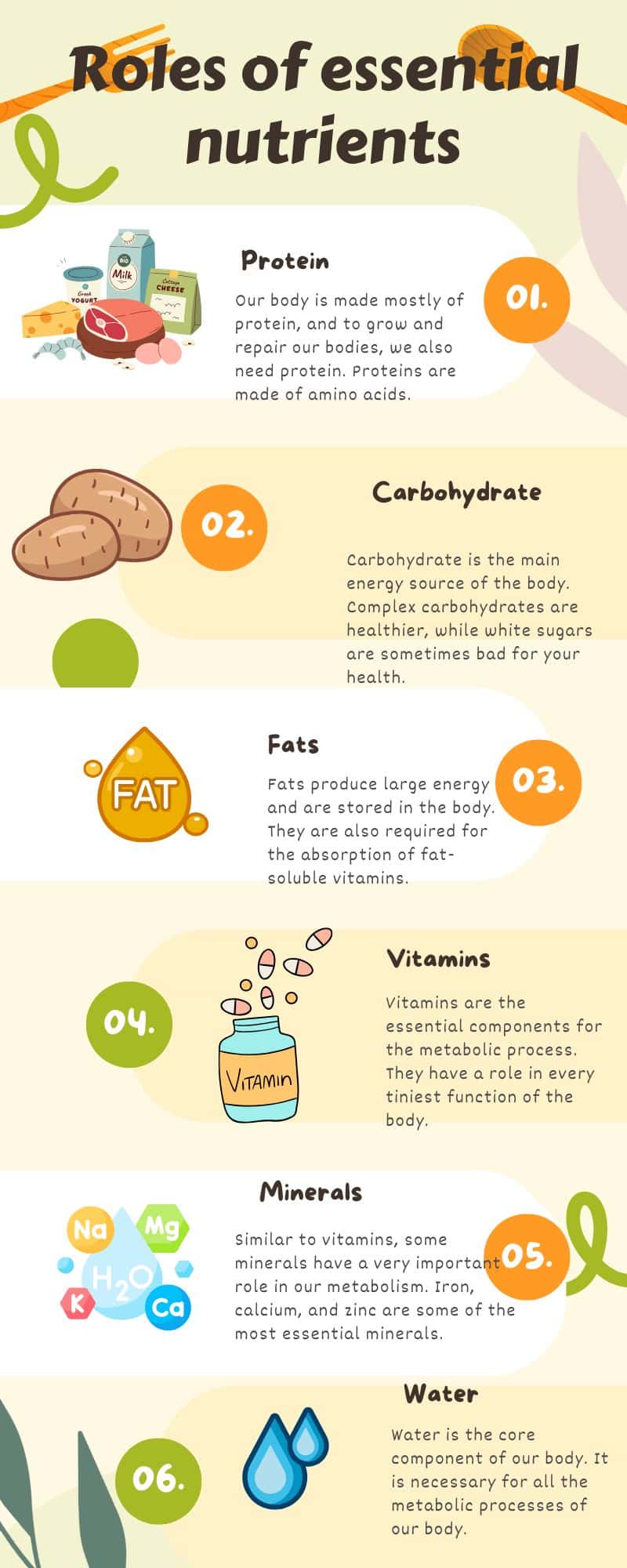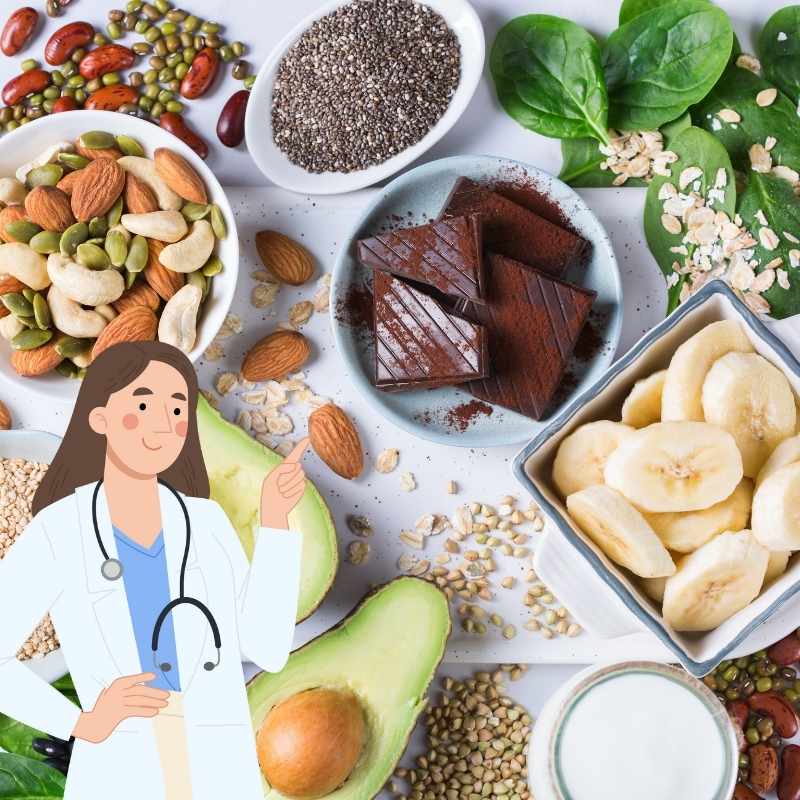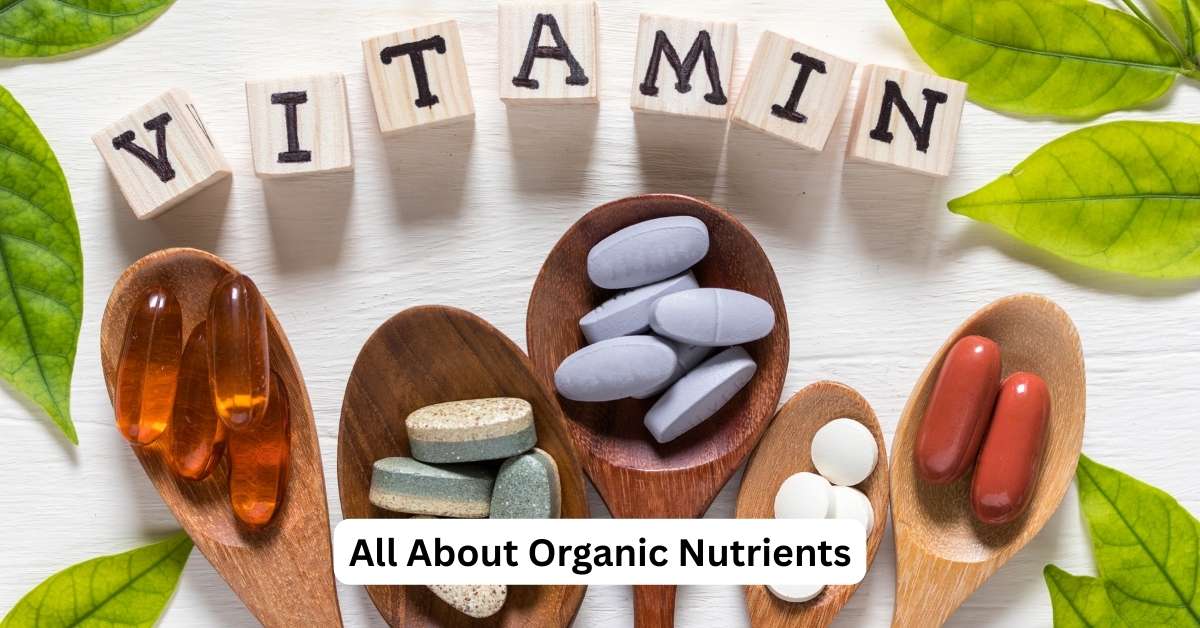Nutrients are essential substances that our body requires for healthy growth, repair, and energy. They are the most vital molecules for the human body; all our metabolic functions are dependent on them. From brain health to immune system support, nutrients have no replacement. Any type of food has some type of nutrients. But all foods are not equal. Some foods contain nutrients, but they also associate some health risks. The key to organic wellness is balancing your diet with every type of essential nutrients.
Hi, we are My Organic Body & Diet (MyOrganicBD), a passionate group of doctors, nutritionists, and writers. We are working together to create the most insightful and scientifically rich articles for the wellness conscious people.
In this article, we will discuss the fundamentals of nutrients, common misconceptions, and all the questions people normally ask about nutrients.
Keep reading.
What are nutrients?
Nutrients are natural components found in the food we eat. They are like the fuel for our lives. But unlike car fuel, we need a variety of complex fuels and components that generate power, and support the metabolic process of our body. Every cell of our body is dependent on the nutrients we take from food.
There are six essential nutrients: carbohydrates, protein, fats, vitamins, minerals, and water.
Each type of nutrient has its own virtue. They are crucial for our health. Even missing one nutrient can ruin your overall health and wellness. That’s why a balanced healthy diet consisting of a variety of food options is a must for wellness. When you consume different types of food, you will get a wider range of necessary nutrients, making you less prone to deficiencies.
What is the Importance of nutrients in our lives?
Nutrients are building blocks of our body, repairing tools of our health, and fuel for all our energy. Every living organism, including humans, needs a consistent supply of nutrients to sustain life.
Nutrients are not some special components of food that some healthy, and pricy foods contain only. If something is referred to as food, it must contain some kind of food value. And by food value, it means nutrients. So no food can exist without nutrients. However, not all foods have equal nutrients. Some have a high diversity of nutrients, some contain antioxidants and minerals, while some contain rare nutrients. All of those have some role in our body and wellness. And even lacking just one essential nutrient can cause a serious impact on our health. There is a saying, You are what you eat. It can be explained scientifically. If you eat a wider variety of food that consists of all the nutrients, your brain, immunity, energy, mental clarity, and overall wellness improve significantly. That’s how you will have a better life, just by eating right.
This article can work as an initial guide for Nutrients on that path.
Nutrients vs Calories – Why Density Matters?
Nutrient is an umbrella term for every essential molecule for the body. While calorie is the unit of heat, when we eat food, our body produces heat and energy. It must come from some kind of macro nutrients.
Dieticians always suggest eating a diverse and nutrient-dense diet. It is best for the body. The more dense nutrients and beneficial molecules enter our body, it has more power to boost our body for ultimate wellness. The less dense and varied you are, the fewer options your body has. That’s why density and diversity matter.
There are terms as empty calories, which refer to the food that just provides you energy from a single nutrient, often sugar. Coke, donut, chips, and many other processed foods can fall in this empty-calorie category.

What are the roles of essential nutrients in Wellness?
Here are the roles of essential nutrients –
- Protein: Our body is made mostly of protein, and to grow and repair our bodies, we also need protein. Proteins are made of amino acids. There are two types of protein: animal protein and plant-based protein. Plant-based protein does not contain all the amino acids. While animal protein contains all the essential amino acids, some of them may come with health risks.
- Carbohydrate: Carbohydrate is the main energy source of the body. Complex carbohydrates are healthier, while white refined sugars are generally bad for your health.
- Fats: Fats stored in our body & produce large energy. They are also required for the absorption of fat-soluble vitamins.
- Vitamins: Vitamins are the essential components for the metabolic process. They have a role in every tiniest function of the body.
- Minerals: Similar to vitamins, some minerals have a very important role in our metabolism. Iron, calcium, and zinc are some of the most essential minerals.
- Water: Water is the core component of our body. It is necessary for all the metabolic processes of our body.
How many nutrients do we need for healthy nutrition?
The daily nutrient needs are different for different genders, activity levels, and age groups. In general, 45-65% of daily calories should come from carbohydrates. Complex carbohydrates are a better choice as they consistently provide energy without a significant rise in blood sugar.
10 to 36% of calories should come from protein. It is essential for repair and tissue growth. Hormones and immune cells are also made of protein.
20-35% of calories should come from healthy unsaturated fats. It is vital for absorbing fat-soluble vitamins. Your diet should consist of different types of fruits, vegetables, and animal products for the necessary vitamins. A small but consistent amount of vitamins is required for body function. Minerals are essential for bones, blood, and cellular growth.
You need 2-3 liters of water for proper metabolism and nutrient transport. You don’t need to sit with a calculator every time, but including everything approximately will do just fine to maintain wellness. However, health calculators will provide you with a good understanding of how many nutrients you need depending on your body and activity level.
Check out our wellness calculators.
What are the main types of nutrients?
There are two basic types of nutrients. We can further divide based on their role.
- Macronutrients: Those are the nutrients we need in large amounts. Primarily used for energy, growth, and repair.
- Carbohydrate: An Energy source for our body. Simple carbs and complex carbs are types of carbohydrates.
- Protein: Required for repair and growth. There are two types of protein: animal protein and plant-based protein.
- Fat: Fat reserves energy. There can be different types of fat: Monounsaturated, polyunsaturated, and trans fat are some of the fat types.
- Micronutrients: Those are the nutrients essential for metabolic processes and required in small amounts. We can also divide them into two sub-categories.
- Vitamins: There are 2 types of vitamins: fat-soluble and water-soluble vitamins.
- Minerals: Iron, calcium, zinc, and magnesium are some examples of essential minerals.
- Phytonutrients: Nutrients that come from plant-based foods, for example, Flavonoids, polyphenols, etc.
- Functional Nutrients: They are nutrients that help achieve certain functions. Adaptogen, omega-3, etc.
- Water: Our body is full of water. Almost 50 to 75 percent of our bodies are water. All our bodily activity and wellness depend on this.
What are the basics of macronutrients?
As we mentioned already, macronutrients are the nutrients that we need in larger quantities. Carbohydrates, protein, and fats are macronutrients. A balanced and richer source of macronutrients is essential for good health. A healthy food contains rich macronutrients with micronutrients like vitamins and minerals.
Carbohydrate is our main energy source in the body. Complex carbohydrates are better for health than refined carbohydrates. Complex carbohydrates like red rice, oats, and whole grain wheat will release energy steadily, which will limit your blood sugar level.
Protein is one of the most important macronutrients as it is required for body repair and tissue growth. 10-35% of the daily calories should come from animal and plant protein.
Fats are an essential component for energy reserve, hormone balance, and nutrient absorption. Olive oil, fish oil, nuts, and seeds are sources of healthy fats. Fried and fast foods often contain trans fats, which can cause heart disease and unhealthy weight gain.
Again check out your daily requirements of macronutrients with our health calculators.
What are the basics of micronutrients?
Micronutrients are vital for our organic wellness. Though our body needs a small amount of these natural molecules. That’s why they are micro nutrients.
Vitamins and minerals are essential micronutrients. They are vital components that regulate metabolism, immunity, skin health, eye health, bone health, nerve function, and many more.
Fruits, vegetables, animal products, nuts, and seeds contain different types of micronutrients. We said two types of vitamins: fat-soluble and water-soluble. Vitamins A, D, E, and K are the fat-soluble vitamins. Vitamin B complex and Vitamin C are the water-soluble vitamins. We need both types of vitamins in the proper amount.
It’s always better to get the micronutrients from organic and unprocessed healthy food & supplements. They have a lot more beneficial components beyond micronutrients.
What are phytonutrients?
Phytonutrients are the bioactive components found in plant-based food. Flavonoids, carotenoids, polyphenols, and gingerol are some of the examples of phytonutrients. They provide antioxidant support. They also offer specific benefits for health and wellness. Phytonutrients can come with different benefits, such as brain health, detox, blood sugar control, and overall wellness. Organic colorful fruits, vegetables, spirulina, and cacao are good sources of phytonutrients.
What are functional nutrients?
Functional nutrients are not conventional nutrients. Foods components that help achieve functional health benefits are generally known as functional nutrients. It can be adaptogens, brain boosting, or detoxing. As this is not a scientific category, conventional nutrients like omega-3 fatty acids, to herbs like ginseng, can be called functional nutrients. Ashwagandha for stress relief, bacopa monnieri for brain function, ginseng for energy boost, coQ10 for cellular energy, Omega-3 for heart and brain health are some of the examples of functional nutrients.
The fundamentals of water?
Water is one of the most vital components as it is the solvent of life. It transports nutrients, detoxifies waste, regulates temperature, and maintains blood volume. From digestion to energy metabolism, every body function is dependent on water. Proper hydration required for optimum brain function, mood, and memory. One should take 2-3 liters of water depending on one’s age, activity, and climate.
We write detailed articles on these topics for ultimate organic wellness. Please go deeper to learn more.
What are the best nutrients for a wellness goal?
If you are looking for the best nutrients for a specific goal, you can try different functional nutrients. Here is a list of nutrients depending on different goals.
Energy: CoQ10, B-vitamins, and spirulina improve energy level and metabolism.
Brain Boost: Bacopa Monnieri, Ginkgo Biloba, Omega-3, and Spirulina have great potential to improve brain health.
Heart health: Hawthorn Berry, CoQ10, and Magnesium are some of the best nutrients for heart health.
Immunity & longevity: Vitamins that support the immune system and provide protection against oxidative stress can promote immunity and longevity. Vitamin C, Zinc, Moringa, and Chlorella are the main functional vitamins for that.
Stress relief and hormonal balance: Ashwagandha, Ginseng, Maca, and Raw Cacao support stress reduction and hormonal balance.
Taking a diverse diet with different types of organic superfoods can easily improve your overall wellness.
What are the nutrients for energy & Vitality?
CoQ10 helps to improve cellular energy. B Vitamins are an essential component of optimum energy function. Ginseng is another powerful energy boosting herb that improves stamina and reduces fatigue. Spirulina also has energy-promoting protein and antioxidants.
What are the nutrients for the brain & focus?
Some of the best functional nutrients for brain health and focus are bacopa monnieri, ginkgo biloba, omega-3 fatty acids, and spirulina. Bacopa monnieri enhances memory and learning ability. Ginkgo Biloba improves the blood flow in the brain, improving brain function. Omega-3 fatty acids support cognitive function of the brain and improve brain power in the long term. Spirulina can improve your mental clarity and stamina.
What are the nutrients for heart health?
Hawthorn berry, CoQ10, magnesium, and nuts and seeds are the best functional nutrients for heart health. CoQ10 supports the energy production of the heart. Magnesium regulates blood pressure and heart rhythm. Nuts and seeds contain heart-friendly fat, fiber, and antioxidants.
What are the best nutrients for Immunity & Longevity?
Vitamin C, Zinc, Moringa, and Chlorella are some of the best functional nutrients for heart health and longevity. Vitamin C is one of the best nutrients for improving immune function. It also provides an antioxidant effect to reduce age signs. Zinc benefits the function of immune cells. Moringa is full of powerful antioxidants and micronutrients that support longevity and metabolism. Chlorella comes with detoxifying and immune-supporting effects.
What are the best nutrients for Stress & Hormonal Balance?
Ashwagandha, ginseng, raw cacao, and maca are some of the best functional nutrients for hormonal balance. Ashwagandha reduces oxidative stress and improves hormone function. Ginseng improves brain power and enhances resilience. Raw cacao helps to improve mood and brain health. Matcha and green tea are great functional nutrients for hormonal balance and energy.
Please read Superfoods for wellness : An Honest Guide for Beginners.

How to get the essential nutrients by Source?
If you want to get balanced nutrients, having a good idea about different nutrient sources can help you. For vitamins, minerals, and fiber, plant-based nutrient sources like herbs, seeds, and berries are your best option. Animal-based foods are rich in Omega-3, collagen, and vitamin B12. They can help you with heart health, bone health, and energy metabolism. Superfoods like spirulina, moringa, cacao, and barley are the best sources for antioxidants and phytonutrients. If you have a busy lifestyle and can’t spend time choosing the best food option, supplement-driven nutrients help you fulfill your nutrient needs. Organic foods usually contain slightly more nutrients than regular ones. Taking a mixed approach to include all types of sources in your healthy diet can improve your overall wellness.
Let’s learn in more detail in the following section.
Plant-Based Nutrients :
Plant-based nutrients like spinach, kale, and broccoli provide dense vitamins and minerals. Parsley, basil, and mint are rich in antioxidants and flavor. Chia seeds, flaxseeds, and pumpkin seeds are a great source of dietary fiber and protein. Blueberries, strawberries, and other fruits contain phytonutrients and antioxidants.
Animal-Based Nutrients
Fish, fish oil, and eggs contain rich omega-3 fats, beneficial for health and brain health. Meat products contain collagen that supports bone, skin, and joint health. Eggs are a great source of vitamin B12, essential for energy and blood production. Dairy products are a great source of calcium and Vitamin D.
Superfood-Derived Nutrients
Spirulina, moringa, cacao, and barley grass contain beneficial nutrients that support overall wellness. Spirulina provides protein, antioxidants, and detoxifying effects. Moringa is rich in vitamins, minerals, and immunity-boosting components. Cacao comes with mood-boosting effects and powerful antioxidants. Barley grass has minerals, fiber, and energy benefits.
Supplement-Derived Nutrients
Supplement-driven nutrients can help you gain specific to overall nutrient support. Concentrated vitamins, minerals, and adaptogenic capsules are an easier way to get essential nutrients. Protein, superfoods, and herbs are often found in powder form. Herbs and root superfood extract supplements are also a way to improve your specific wellness goal.
In one sentence, you have to take a healthy balanced diet to fulfill the nutrients needed. Please read Healthy Diet – benefits, Tips and Mindful Nutrients Needs.
What are Nutrient’s deficiencies?
Nutrient deficiencies are a lack of essential nutrients that are essential for health. Deficiency can cause poor immunity, stunted growth, energy problems, and affect overall wellness. Lack of water can disrupt hydration and cellular function. Lack of vitamins can affect the immune system and repair. Lack of protein can reduce muscle mass and tissue health. Maintaining a balanced diet is important for avoiding deficiencies.
Why is this increasing alarmingly?
In this busy ai era modern diet consists of low-nutrient and highly processed food. They often contain one or a few types of nutrients. This makes people more susceptible to nutrient deficiency. Hybrid and modern agricultural technology is also responsible for the low nutrient density of food. Over-cultivation and poor agricultural practices are some of the common reasons for low nutrients in food. Lifestyle changes also limit our attention to nutritious foods. People want taste rather than nutrition from food. They are less health conscious.
What is the common nutrient deficiency?
Billions of people all over the world get less or inadequate levels of micronutrients that are critical for health according to Harvard health.
Vitamin D deficiency is one of the common nutrient deficiencies due to low sun exposure. Women in pregnancy also suffer commonly from vitamin D deficiency. The modern processed diet also lacks Iron, increasing the risk of anemia. Magnesium and zinc deficiency reduce immunity and metabolism. Lack of calcium is another common nutrient deficiency affecting bone and teeth health.
What are the health risks?
For each nutrient deficiency, you can have several symptoms and diseases. Long-term nutrient deficiency leads to chronic diseases. It can even reduce your longevity!
Here are some examples –
- For protein deficiency, you will have poor immunity, muscle loss, and swelling.
- Iron deficiency will cause anemia, tiredness, pale skin, and dizziness.
- Vitamin D deficiency will cause weak bones, rickets, osteoporosis, and poor immunity.
- Folate deficiency causes anemia and birth defects.
- Lack of iodine causes thyroid, and slow metabolism.
- Magnesium deficiency causes irregular heartbeat, anxiety, and muscle spasms.
How Superfoods & Supplements Can Help?
Superfood supplements can help you fill the nutrient gaps, especially for people with a tight schedule. Different supplements can improve your energy level. Nutrients like vitamin B, Ginseng, or macha can help you get better energy. Coffee, lion’s mane, and omega-3 fatty acids are great supplements for brain health. If you have an exam or need a boost in mental clarity, those supplements can help you. Supplements like vitamin C and other herbs can support the immune system. Chia, flax, and spirulina are some excellent supplements for digestive health. For health, omega-3s and polyphenols can be a great option. It depends on your health goal and preferences.
How do you choose the right supplements?
Here is a very simple way to choose the right supplements for you. First, decide your wellness goals and check out the options for that. Let’s say you want to improve brain health. You will have options like getting ginkgo biloba, omega-3, vitamin B, Beetroot juice, etc. Based on gender, age and health conditions, you can choose the benefits you like most. Omega-3s have brain benefits, but it’s also great for inflammation & wellness. Vitamin B will give a brain boost and energy boost, while beetroot can offer detox effects. Choose the one that fits you and use it as per the guidance of a wellness coach, dietician or doctor.
MyOrganicBD Nutrients Library & Personalized Wellness
We wrote hundreds of articles for healthy conscious living. To find a specific wellness goal solution, you can read the contents of the Diet section. We try to cover elementary wellness issues with the best healthy diet and natural supplements. Check tools and participate in quizzes. Spend some time researching our website.
We know every human is unique. You might go much deeper with your unique needs. Then come to our professionals. We have seasoned clinical nutritionists, dieticians, and personal wellness coaches. They will listen, measure, and give you personalized solutions in compliance with organic wellness.
Please don’t hesitate to book an appointment.
FAQ
How to get all the nutrients in one meal?
Getting all nutrients from one meal is not very hard. Combine Complex carbs, lean protein, colorful vegetables, healthy fats, and seeds. You will get almost all the necessary nutrients from one meal. You can consult a dietician for a more personalized meal plan.
What is the healthiest water to drink?
Clean, filtered water with balanced nutrients is the healthiest. If it is clean, it doesn’t matter if it’s from the Himalayas or random places.
What are the six essential nutrients?
Carbohydrates, fats, protein, vitamins, minerals, and water are the six essential nutrients.
Are supplements necessary if I eat organic foods?
You don’t need supplements usually if you take a balanced organic diet. But supplements can reduce the risks of deficiency & improve wellness.
Which nutrients are most important for energy?
For energy in the body, carbohydrates, B-vitamins, iron, magnesium, and healthy fats are the core nutrients.
How do I know if I have a nutrient deficiency?
If you are noticing signs like weak immunity, hearing loss, brittle nails, slow recovery, and poor concentration, you may have a nutrient deficiency. Tests are required to confirm the deficiency
Are plant-based nutrients enough for overall health?
Yes, with proper knowledge and some fortified foods or supplements like B12, vitamin D, and omega-3, plant-based nutrients are enough for overall health.
Final thoughts
Nutrients are the foundations for a healthy body & mind. They fuel, repair, and protect our bodies from various diseases. Modern lifestyle and processed foods often lead to low-nutrient pleasure-driven foods. So it is very crucial to pay close attention to what nutrients we are taking. This article helps you get a better understanding of nutrients. Help you live a healthier life with the power of organic superfoods & supplements.
Please read Organic Food for a Healthier Lifestyle.
Mr. Shariful Alam Pavel believes in natural living. To live a healthy conscious living, we need to eat green, live green. MyOrganic Bd is a green wellbeing brand, educating millions to live a better life with mother nature.
- Shariful Alam
Dr. Goutom Banik, MBBS, MPH, is a public health researcher with extensive experience in maternal, newborn, and child health, including nutrition interventions in underserved communities. He has worked with leading organizations such as Save the Children and icddrb, contributing to national strategies on child health and nutrition. His expertise spans operational research, health systems strengthening, and community-based programs addressing childhood illness.






